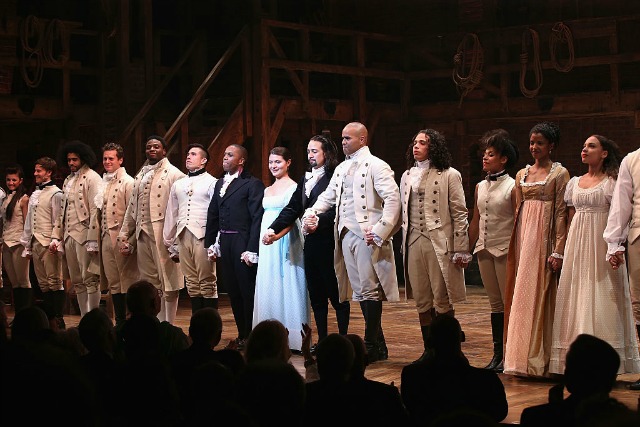On The Eve Of 'Hamilton's' Chicago Debut, A Look At Its Radical Empathy
By Chicagoist_Guest in Arts & Entertainment on Oct 18, 2016 8:44PM
By Caroline Siede
Note: This is not a review of the Chicago production of Hamilton, but a consideration of larger themes encompassed in the musical, book and cast recording. After three weeks of preview performances, Hamilton officially opens at The PrivateBank Theatre on Wednesday, Oct. 19.
In the final few moments of Hamilton, after the duel for which they’re both most famous has finally occurred, Aaron Burr bemoans to Alexander Hamilton, “Now I’m the villain in your history.” But while that may be the case for the history books, it isn’t the case for Hamilton itself. Burr isn’t the villain of the musical, he is its narrator and co-protagonist. And in choosing to humanize Burr rather than vilify him, creator Lin-Manuel Miranda establishes Hamilton’s most powerful thesis statement: History is rarely shaped by easy binaries, and more often by flawed humanity.
It would’ve been understandable had the show bearing his name fallen into pure Hamilton hagiography, but Miranda is as interested in Hamilton’s flaws as he is in his achievements. Miranda’s version of Hamilton is brash, proud, defensive, and hyper-intellectual. Those qualities make him both a great leader and, at times, an insufferable human being—a duality the show acknowledges rather than ignores. The show celebrates Hamilton’s strengths, while inviting the audience to sympathize with his flaws too.

Which is the case for Burr as well. Though he’s depicted as overly cautious, and lacking in a strong principles, Burr emerges as perhaps the most relatable character in the entire show. His timidity stems not from laziness but from a fear of making a mistake, as he admits in his Act One solo “Wait For It”—a song Miranda has cited as one of the best in the show.
“I’m not falling behind or running late,” Burr sings, “I’m not standing still I am lying in wait.” In constructing a motive for Burr’s historical inactivity, Miranda selects the most empathetic option; Burr isn’t a bad person, he’s a man struggling to figure out how to make his move even as everyone around him seems to have all the answers.
But nowhere is Hamilton’s inherent empathy more apparent than in the show’s treatment of its female characters. Plenty of historical stories simply ignore the perspectives of women in favor of focusing on more iconic men. But Miranda realizes that even though they were denied access to political power, women were no less complicated and compelling historical figures.
In sisters Angelica and Eliza Schuyler, Miranda crafts characters every bit as complex as Hamilton and Burr. And he offers a compassionate understanding of their actions too. The song “Satisfied” zeroes in on the kind of social and emotional intelligence women of Angelica’s social standing needed in order to survive in a world that was especially unkind to them. That Angelica is later seen both fiercely protecting her sister’s happiness and carrying on an emotional affair with her brother-in-law is a sign not of her inherent moral failing, but of her imperfect, relatable humanity.

'Hamilton' Broadway / Getty Images / Photo: Neilson Barnard
And though the show laments the way Hamilton’s achievements have largely been forgotten over time, it also acknowledges that the achievements of women were seldom even noted in the first place. Remarkably, Miranda gives the final number of the show not to Hamilton but to Eliza, who outlived her husband by 50 years. “Who Lives, Who Dies, Who Tells Your Story” is a powerful historical corrective in which Miranda allows great men like George Washington and Lafayette to literally sing the praises of the woman who helped keep their legacies alive. That’s an empathetic, revolutionary reframing of the role women played in history.
If Alexander Hamilton’s story proves that politics have long been tumultuous and scandalous, Hamilton the musical argues our tendency toward simplification seldom encapsulates the full picture. For every truly scorn-worthy King George or Donald Trump, there’s a dozen complex figures deserving of a more nuanced examination. History may sometimes obliterate fine distinctions, but Miranda paints with a far more empathetic brush.